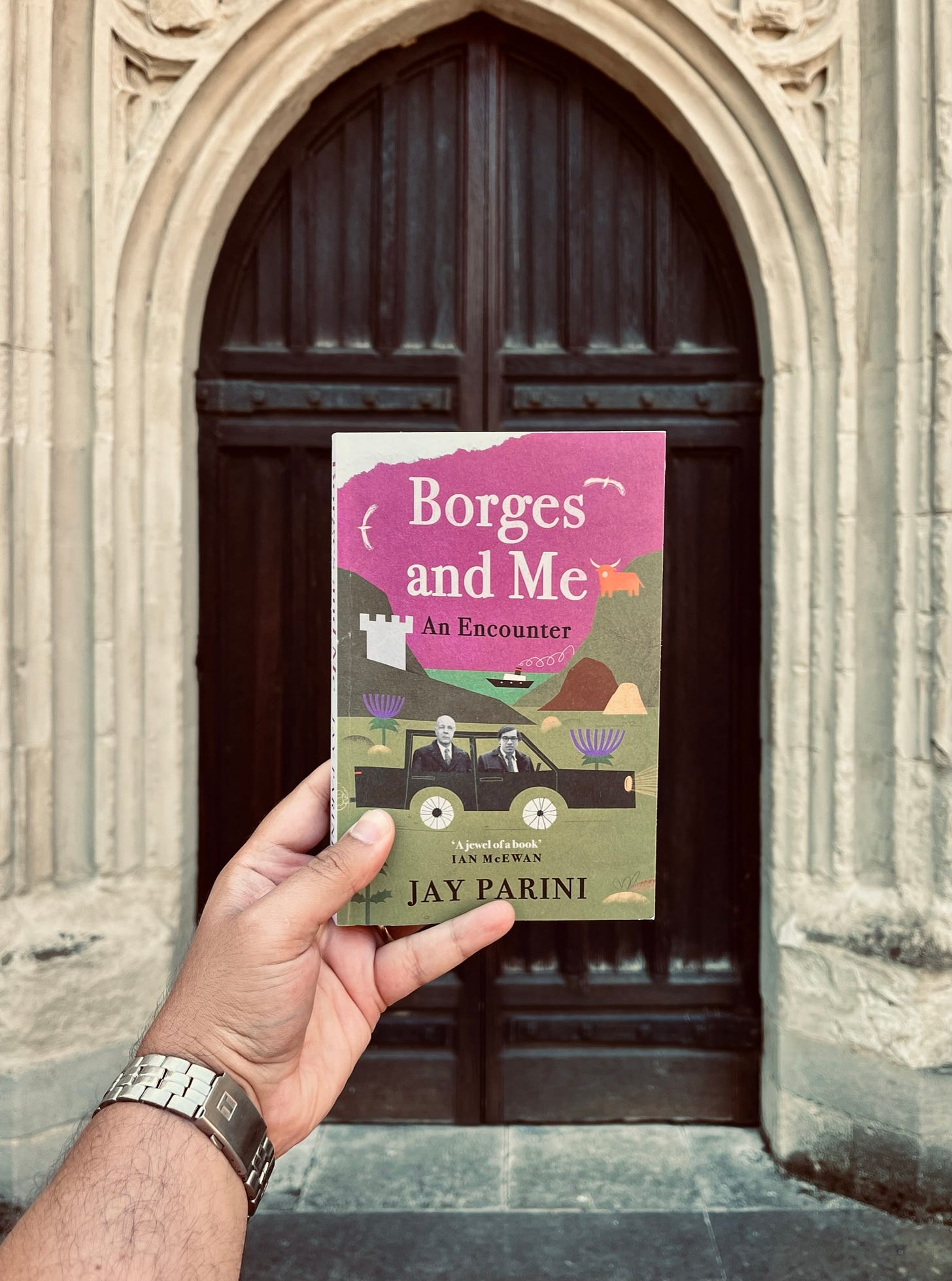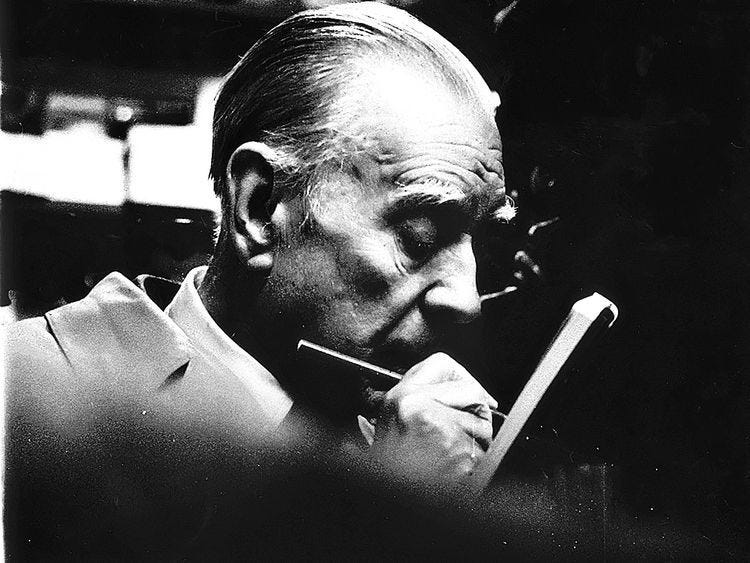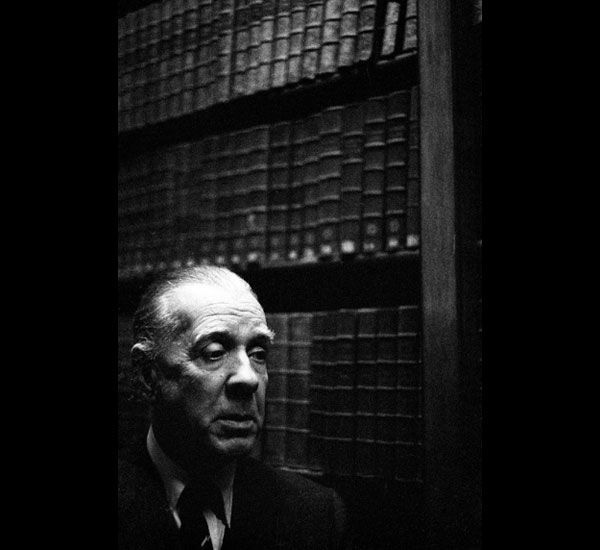War, Borges and Me.
"Remember that the battle between good and evil persists, and the writer's work is constantly to reframe the argument, so that readers make the right choices."
“Remember that the battle between good and evil persists, and the writer's work is constantly to reframe the argument, so that readers make the right choices.”
I often wonder what my life would have looked like if I had stayed in Russia - the country where I grew up, but where I wasn't born. In the autumn of 2007, at the age of 17, I left Moscow for Prague to pursue my Bachelor's degree and have stayed away since then.
I know that my life between 2007 and February 24th, 2022, would have been more or less the same if I had stayed, but... after February 24th, with the launch of a meaningless and bloody war, as a healthy male, I would have had to flee mobilization in the same way many of my friends and classmates fled and continue to do so right now.
While for myself this path is hypothetical, for Jay Parini, the smell of war came way too close. In the 1970s, he was about to be drafted by the bloodthirsty politicians to be sent to the war in Vietnam. His friends were already holding guns in the forests of Vietnam, and Jay, who dreamt of becoming a poet, knew that his life might end if he boarded a military plane headed to Southeast Asia.
Instead, he hurriedly boarded a civilian plane to Scotland. He persuaded the University of St. Andrews to shelter him so he could write a PhD thesis on the Scottish poet George Mackay Brown.
It took Parini 50 years to fully digest, comprehend, and absorb what happened to him in Scotland. There, he met the Scottish poet Alistair Reid, who, besides poetry, was also a prominent scholar of South American literature. Reid worked as a secretary for Robert Graves. However, his employment was terminated after Graves pointed a gun at him because he slept with one of Graves's lovers. Reid was also a friend of the Argentinian genius Jorge Luis Borges. He translated and edited Borges's works into English.
Every person who has ever met Borges, however briefly, couldn't resist writing about their encounter with this Argentinian mystic. Alberto Manguel, Paul Theroux, V.S. Naipaul, Mario Vargas Llosa are just a few who wrote about their impressions of him.
The difference between them and Parini, however, is that the latter had no idea who Jorge Luis Borges was when he met him. If you read Manguel's, Llosa's, or Theroux's accounts, you will get a sense that they know they are in the presence of a genius, and this makes them biased. They met their hero, and as we know, meeting our heroes is the worst thing we can do.
Parini, on the other hand, was ignorant about who this Argentinian mystic was, and his ignorance was bliss. He was just a PhD student who wanted to escape death and dreamt of becoming a poet. He wanted to learn how to write, so he listened carefully when Reid told him that in order to be a good writer, you need to be a good gardener first.
“Vision and revision. You prune a rosebush back to its roots. Then it flowers properly." Reid paused. "Are you a gardener?"
"No."
"That's too bad," he said. "You must take it up."
It seemed bizarre that he advised me to garden! Yet I knew he was right, that I had missed out on connecting to the physical world in the tactile way of gardeners, and if I was to be a poet, I would need to learn how to touch and see and smell.
Parini met Borges at Reid's house. Borges was already in his 70s at that time and was completely blind. When he couldn't hear what anyone said, he used to exclaim:
“Speak louder! Can’t you see that I’m blind?”
They ate a lot, they drank a lot, they talked about literature a lot, and then Borges asked them to take him to the North Sea. They obliged, and what unfolded is one of the most inspiring scenes in the book.
Standing in front of the North Sea, the blind Borges starts walking towards it without any help. Then...
Borges stopped on the brink of a sweeping dune, listening to the water or perhaps the gods. He lifted his arms with his cane in the air and whirled around, but when he stopped, he was facing us and the Old Course, not the sea. In a thundering manner, he began to recite The Seafarer in its original Anglo-Saxon.
"Mag ic be me sylfum / sodgied wrecan, / sipas secgan."
"Should we turn him around?" asked Jeff in a whisper.
"Let him be," I said. It was too wonderful, unlikely and satisfying: a blind old poet beside a putting green.Alastair translated the crucial lines for us: "I can make a true son / of myself, and tell you about my travels, / and the days of struggle that I have endured."
I would advise you, my dear reader, to read that poem in its entirety. The beauty of its melancholic wisdom alters the course of one's heart.
Soon after, Reid had to travel to Oxford to attend an urgent family matter. He asked Jay - or, as Borges called him, Giuseppe - to look after the blind poet. While Reid was in Oxford, the 70-year-old Borges and the 20-something Parini embarked on a journey across the Scottish Highlands.
I have to mention this... there is a reason why the word "cosy" comes from the Scots language. The cosy inns, pubs, bookshops, and churches that Borges and Parini stopped at during their journey almost compelled me to sell my house in England, rent a large van, and move my life to cosy Scotland.
You might be wondering why a blind man would want to see Scotland. After all, he is blind. A poet would reply to this question:
"There is more than one way to feel your surroundings. There is a sense of the wind caressing your skin, there is the smell of the water in the lakes and the leaves on the trees, and you can sense where you are through choice of words and accents that people use. "
On this journey with the blind mystical poet, Parini learned how to write. Their conversations and experiences revealed what it means to be a writer. According to Borges, to be a writer is... ‘to find a language adequate to what is revealed.’
Writers are always pirates, marauding, taking whatever pleases them from others, shaping these stolen goods to our purposes. Writers feed off the corpses of those who passed before them, their precursors. On the other hand, they invent their precursors. They create them in their own image, as God did with man.
I bought this book to catch a glimpse of Borges as he truly was. There is an aura of mystery surrounding him due to his labyrinthine stories, but when you watch his interview with William Buckley, you bear witness to an erudite and cheerful man, who would have been a key figure at an intellectual dinner party.
We all yearn for a friend like him, with whom we can engage in conversations that transcend the realms of pop culture, work life, or the next holiday destination.
Before our paths diverge, dear reader, allow me to share two intertwined ideas expressed by Borges in this book.
The first idea is that 'nobody can teach us anything.' There is truth in this notion. Personally, I have always enjoyed learning but never relished being taught. Borges asserts that everything he knows is gleaned from books.
Nobody can teach you anything. This is the first truth. We teach ourselves. All my life I have lived in books, in libraries.
I remember every library in my life as I remember my lovers, their smells, the texture of their skin, the taste, even the brightness in the air around them. Or the darkness.
And finally, imagine if Parini had gone to the Vietnam War instead of Scotland. How utterly pointless and futile it would have been! He could have lost his life, and, even more tragically, he would have never had the chance to meet Reid, Mackay Brown, and Borges himself.
One can't help but wonder how many beautiful encounters like these have been forever lost due to the senselessness of war.
Confide tibimet.
P.S.
Dear friend,
Below you can find my personal notes and commentaries to this book. It’s free, but there’s a small warning - they contain spoilers. So, if you plan to enjoy this book yourself, consider bookmarking this page to check it after you finished reading this book.
As always, if there will be any technical difficulties feel free to reach out! :)









This is lovely. You are a poet.
What a beautiful review! I need to read Borges... but I have no idea where to start. When I was in my 20s I never was interested in latin american writers. Im now in my 30s and in a point where I love to discover and can truly appreciate authors like him. Will save this book for later too of course!
I also agree with this of learn alone, except with languages, in my case I could not learn without a guide, at least not ancient Greek jaja